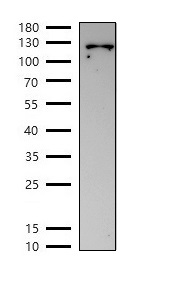CD115 antibody
Catalog Number:
- 产品信息
- 相关图片
- 常见问题
|
Basic infomation |
source |
Mouse |
|
Clonality |
Polyclonal |
|
|
Isotype |
IgG |
|
|
Reactivity |
H M R |
|
|
MW (kDa) |
108kDa |
|
|
Purification |
Antigen affinity purfication |
|
|
UniProt ID |
P07333 |
|
|
NCBI Gene |
1436 |
|
|
|
|
|
|
Applications |
Tested Applications |
WB, |
|
Cited Applications |
WB, IHC, IF |
|
|
Product Usage Information |
Western Blotting |
1:500-1:2000 |
|
Immunohistochemistry |
1:200-1:400 |
|
|
Immunofluorescence |
1:200-1:400 |
|
|
|
|
|
|
Storage |
PBS with 50% glycerol and less than 0.02% sodium azide |
|
|
Store at –20°C, stable for one year after shipment |
||
|
Do not aliquot the antibody |
||
|
|
||
|
Background |
The protein encoded by this gene is the receptor for colony stimulating factor 1, a cytokine which controls the production, differentiation, and function of macrophages. This receptor mediates most if not all of the biological effects of this cytokine. Ligand binding activates the receptor kinase through a process of oligomerization and transphosphorylation. The encoded protein is a tyrosine kinase transmembrane receptor and member of the CSF1/PDGF receptor family of tyrosine-protein kinases. Mutations in this gene have been associated with a predisposition to myeloid malignancy. The first intron of this gene contains a transcriptionally inactive ribosomal protein L7 processed pseudogene oriented in the opposite direction. Alternative splicing results in multiple transcript variants. Expression of a splice variant from an LTR promoter has been found in Hodgkin lymphoma (HL), HL cell lines and anaplastic large cell lymphoma. |
|
|
|
|
|
|
Abbreviation |
H: human M: mouse R: rat Rb: rabbit Hm: hamster Mk: monkey Vir: virus C: chicken Z: zebrafish Dg: dog Pg: pig Hr: horse |
|



 返回列表
返回列表